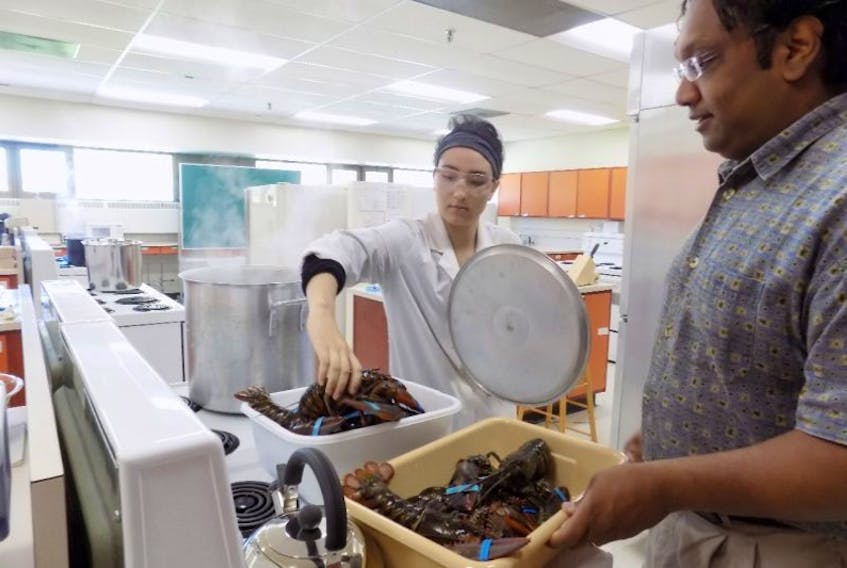Hoping to share some local fare from his province of employment with them, he purchased a one-pound pack of frozen lobster that was labeled as being from Atlantic Canada. But when he cooked it up, he was disappointed with the results.
“The taste wasn’t very good,” he said.
The lobster had been frozen with the typical brine solution that it has been packaged with for years.
“I’m sure I can do better,” Razul said.
Since that time, he’s been using his expertise as a chemist to search for a solution. That has led him to study lobster on a molecular level. His research is focused on compounds called cryoprotectants, which are substances that protect biological structures from the damaging effects of ice formation, he explained.
“The focus of my research is to better understand how these compounds can be used to cryopreserve cooked lobster meat in frozen storage. I am interested in how these cryoprotectants inhibit or disrupt ice formation and preserve the integrity of the biological structures."
Razul uses both experiments and computer modeling, which provide him with unique insights into how cryoprotectants can be used in a practical way.
He says all the ingredients he’s using in his test are natural ingredients already used in the food industry.
“What I’m trying to do is incorporate natural cryo molecules that can enhance and impart onto the lobster a better taste and texture.”
Razul is currently embarking on a yearlong study to quantify the effectiveness of the cryoprotectant formulation. The study will also involve a sensory analysis, which is a taste test, in the near future.
As a lobster lover himself, he said he understands that taste is of the utmost importance.
Razul’s ultimate hope is that his findings can be applied to lobster and other seafood species. The impact could be huge by extending the shelf life and also deliver a higher quality product to Nova Scotia and around the world.
He said the way for packaging and freezing lobster is something that’s been an industry standard for about 40 years.
“If you talk to people in Nova Scotia – and some of my relatives here who have been fishermen for generations – this is what they’re family did.”
He said it’s rewarding to be able to apply his scientific knowledge to provide a practical solution that could benefit Nova Scotia and the industry he cares about.
Students and others at the university easily buy into the idea and are helping with the work, because they can see the immediate benefits and what it could mean.
“It’s a combination of really hard science and food.” Razul said.
He even has members from the human nutrition department working with him and have allowed for the usage of their kitchen to cook lobster for the tests.
Razul said it’s great having their knowledge because they know how to properly handle and prepare food.
The first tests will be on frozen cooked lobster and testing began this week for that.
He hopes that at the end of the year, it will result in a concrete solution that could be altered for use with other seafood.
“What we want is really solid scientific data that can be examined in detail,” he said.
The results are something he hopes people like himself will be proud to share with the rest of the world.









